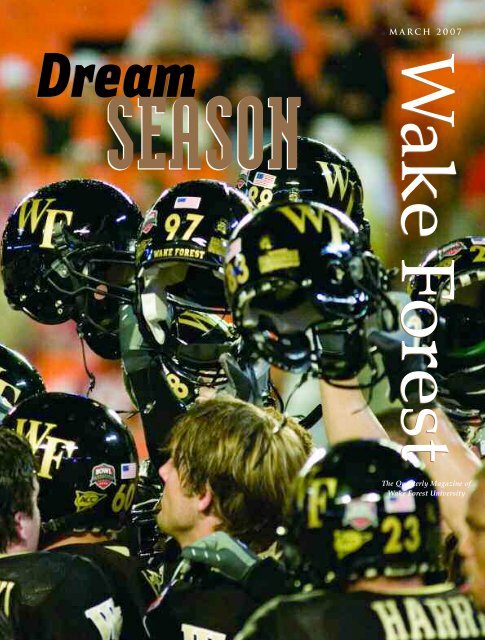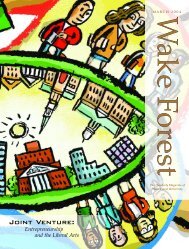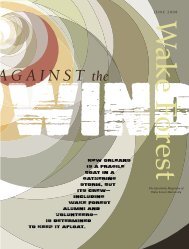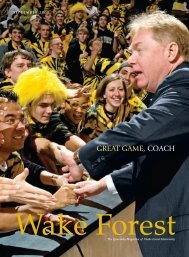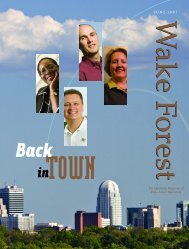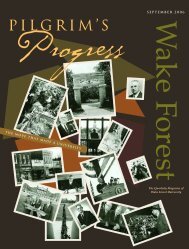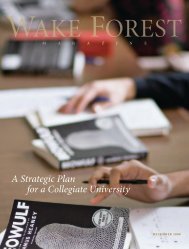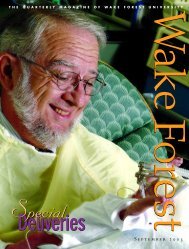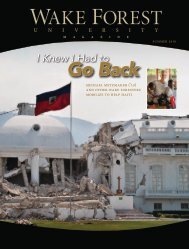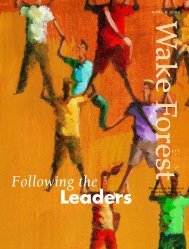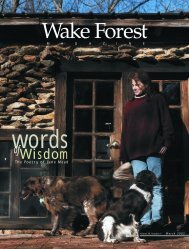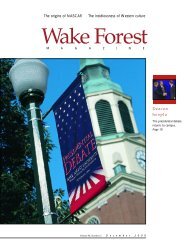Wake Forest Magazine, March 2007 - Past Issues - Wake Forest ...
Wake Forest Magazine, March 2007 - Past Issues - Wake Forest ...
Wake Forest Magazine, March 2007 - Past Issues - Wake Forest ...
- No tags were found...
You also want an ePaper? Increase the reach of your titles
YUMPU automatically turns print PDFs into web optimized ePapers that Google loves.
M a r c h 2 0 0 7DreamSEASONThe Quarterly <strong>Magazine</strong> of<strong>Wake</strong> <strong>Forest</strong> University
F E A T U R E SEDITORCherin C. Poovey (P ’08), poovey@wfu.eduASSOCIATE EDITORKerry M. King (’85), kingkm@wfu.eduDESIGN / ART DIRECTIONSherry Simmons, simmonse@wfu.eduUrena Design, durena@triad.rr.comPHOTO GRAPHERKen Bennett, bennettk@wfu.eduCLASSNOTES EDITORJanet Williamson (P ’00, ’03), williajm@wfu.eduSENIOR WRITERDavid Fyten, fyten@wfu.eduPRINTINGThe Lane Press, Inc.Burlington,Vermont<strong>Wake</strong> <strong>Forest</strong> <strong>Magazine</strong> (USPS 664-520 ISSN0279-3946) is published four times a year inSeptember, December, <strong>March</strong>, and June bythe Office of Creative Services,<strong>Wake</strong> <strong>Forest</strong> University, P.O. Box 7205,Winston-Salem, NC 27109-7205.It is sent to alumni, donors, and friends of theUniversity. Periodicals postage paid atWinston-Salem, NC 27109,and additional mailing offices.POSTMASTER: Send address changes to<strong>Wake</strong> <strong>Forest</strong> <strong>Magazine</strong> Alumni RecordsP.O. Box 7227Winston-Salem, NC 27109-7227.6 Dream SeasonBy Dan Collins2 A R O U N D T H E Q U A D30 C L A S S N O T E SOf all the adjectives used to describe the Deacons’11–3 football season—one that included an ACCtitle and a trip to the Orange Bowl—the mostappropriate may be “incomparable.”Volume 54, Number 3<strong>March</strong> <strong>2007</strong>Copyright <strong>2007</strong>W W W. W F U . E D U
14 Rhodes RunBy David FytenThe dramatic increase in Rhodes Scholarshipsawarded to <strong>Wake</strong> <strong>Forest</strong> undergraduatesdidn’t just happen. It’s one outcome of a planto recruit and cultivate top students.P R O F I L E SC O N S T A N T & T R U E24 A Great RunBy Cherin C. Poovey (P ’08)In academics and athletics,senior and newest RhodesScholar Michelle Sikessets the pace.26 The Hermit in theWait Chapel TowerBy David FytenRoman Catholic priestSamuel Weber helpsinfuse the Divinity Schoolwith “true ecumenism.”48 The Little SchoolThat DidBy Dave JosephEvery Deadheadshould adopt thisschool. Jerry Garciameets Mr. Whipple.The smallest schooland the coolest.
Ed Christman (’50, JD ’53)Founders’ DayFaculty honored; Christmanreceives Medallion of MeritCHAPLAIN EMERITUS EDCHRISTMAN (’50, JD ’53),counselor and friend to generationsof students and <strong>Wake</strong> <strong>Forest</strong>’sspiritual guiding force for decades,received the University’s highesthonor, the Medallion of Merit, atFounders’ Day Convocation onFebruary 22. Christman retired in2003 after serving as chaplain forthirty-four years.“Seldom does an institutionspawn a graduate who so thoroughlyembodies its soul, ProHumanitate,” said President NathanO. Hatch. “His compassion andkindness, combined with his wittyand wonderfully irreverent spirit,have made some proclaim he is<strong>Wake</strong> <strong>Forest</strong>’s demon deacon.”Christman came to <strong>Wake</strong><strong>Forest</strong> intending to be an attorney,but after graduating from lawschool, he attended SoutheasternBaptist Theological Seminary onthe Old Campus. He became Baptistcampus minister in 1956 andwas later named assistant chaplainand then chaplain in 1969.Christman was honored followingthe Convocation address byPaul Rusesabagina, whose courageduring the Rwandan genocidein 2004 inspired the film “HotelRwanda.” Also during Convocation,the following awards werepresented to faculty:Kulynych Family Omicron DeltaKappa Award for Contribution toStudent Life — DAVID YAMANE,assistant professor of sociology;Kienzle Teaching Award —STEPHEN BRYAN, assistant professorof accounting (Babcock School);Cowan Faculty Research Prize —SARA MOELLER, assistant professorof finance (Babcock School);Joseph Branch Excellence inTeaching Award — WENDYPARKER, professor of law.For more on Convocation,see www.wfu.edu/convocation.2 WAKE FOREST MAGAZINE
Discovery: Atala’s team makeshistory with groundbreakingstem-cell researchTHE LATEST ANNOUNCEMENTby the medical school’s Dr.Anthony Atala—that his team ofresearchers had discovered a newsource of stem cells in amnioticfluid that could be used to producea variety of tissue types—drew national attention and wascited on the floor of Congress bythose for and against embryonicstem-cellresearch.Atala, along with colleaguesfrom the <strong>Wake</strong> <strong>Forest</strong> School ofMedicine and Harvard MedicalSchool, reported that they hadused stem cells drawn fromamniotic fluid to create muscle,bone, fat, blood vessel, nerve,and liver cells in the laboratory.Their findings could lead tobreakthroughs in replacing damagedcells and tissue in treatingpatients with spinal cord injuries,diabetes, and Alzheimer’s, butpreliminary tests in patients arestill years away.“Our hope is that these cellswill provide a valuable resourcefor tissue repair and for engineeredorgans as well,” saidAtala, a senior researcher anddirector of the Institute forRegenerative Medicine. Atala’sfindings—the result of sevenyears of research—were first publishedin January in the scientificjournal Nature Biotechnology.Atala and his colleaguesreported that they had discoveredthat a small number of stem cellsin amniotic fluid—estimated at1 percent—can give rise to manyof the specialized cell types foundin the human body, although theyaren’t sure exactly how manydifferent types. “So far, we’vebeen successful with every celltype we’ve attempted to producefrom these stem cells,” he said.The newly discovered cells mayrepresent an intermediate stagebetween embryonic stem cellsand adult stem cells.Amniotic stem cells comefrom the fluid surroundingunborn babies and their placentas.Atala’s team obtained thecells using placentas or fluidfrom amniocentesis, a medicalprocedure commonly performedon unborn children to test forgenetic diseases. Because amnioticstem-cellresearch doesn’t harmthe fetus, Atala’s research avoidsthe controversy that surroundsembryonic-stem-cell research.President Bush vetoed legislationlast year that would haveAtalaeased restrictions on federallyfunded embryonic-stem-cellresearch. In January, the sameweek that Atala’s research wasreleased, the U.S. House againpassed legislation supportinggovernment-funded research.The Senate had yet to take upthe issue by late January.Both sides in the House debateused Atala’s research to supporttheir positions, even as he cautionedthat amniotic stem cellsshould not be considered areplacement for embryonic oradult stem cells.“It is essentialthat National Institutes of Healthfundedresearchers are able tofully pursue embryonic-stem-cellresearch as a complement toresearch into other forms ofstem cells,” he wrote in a letterto Congress.Atala’s announcement wasthe latest advance in regenerativemedicine to come from his teamsince he moved to <strong>Wake</strong> <strong>Forest</strong>three years ago from Harvard University.Last year, he and his colleaguesrebuilt bladders for sevenyoung patients using tissue grownfrom the patient’s own cells.A R O U N D T H E Q U A Dwww.wfu.edu/wowf MARCH <strong>2007</strong> 3
A R O U N D T H E Q U A DGatewood receivesinternational awardfor ‘Diana Project’B ETSYGATEWOOD,director of theUniversity’s Officeof Entrepreneurshipand LiberalArts, and fourresearch partnersGatewood at other universitieshave won a prestigiousinternational award for theircontributions to entrepreneurshipand small business researchover their careers, both individuallyand as a research team.Gatewood, who is also aresearch professor in the CallowaySchool of Business and Accountancy,joined with professors fromHarvard, Babson College (Massachusetts),and the University ofSt. Thomas (Minnesota) in 1999to form a research consortium,the “Diana Project,” to studywomen entrepreneurs and theirbusinesses.Gatewood and her colleaguesreceived the FSF-NUTEK Award,which recognizes outstandingresearch on entrepreneurshipand small-business development,and she will travel to Sweden inMay to receive the award. Theaward, given annually since 1996,is sponsored by FSF, the SwedishFoundation for Small BusinessResearch, and NUTEK, theSwedish Business DevelopmentAgency.Eure named AssociateDean of the CollegeLONGTIME PROFESSOR OFBIOLOGY Herman Eure(PhD ’74) has been appointed anAssociate Dean of the College.Eure will work on faculty developmentissues, while continuingto teach in the biology department.Eurejoined thefaculty in1974 andserved aschair of thebiologydepartmentfrom 1998through 2006. EureFormer student establisheschair to honor GohoAFORMER STUDENT of professorThomas S. Goho hasestablished a chair of finance inthe Calloway School of Businessand Accountancy in Goho’shonor. The donor, now a successfulinvestment banker, asked toremainanonymous.Goho, whojoined thefaculty in1977, will bethe firstholder of thechair.GohoB R I E F SBiology’s Connernamed AAAS FellowPROFESSOR OF BIOLOGYWilliam E. Conner has beennamed an American Associationfor the Advancement of Science(AAAS) Fellow. Conner, whojoined the faculty in 1988, iswidely known for his researchinto animal communication andsexualselectionin insects.AAAS isthe world’slargest generalscientificsociety andpublisher ofthe journal ConnerScience.Student award honorsPhillips, professor emeritaASTUDENT AWARD has beenestablished in honor of oneof the University’s first femalefaculty members, now retiredProfessor of English ElizabethPhillips. The award will be presentedduring Commencementto the undergraduate or graduatestudent writing the best essayon women’s and gender studiesduring the year. Phillips joinedthe faculty in 1957 and retiredin 1989. She served as actingcoordinator of the women’s and4 WAKE FOREST MAGAZINE
Phillipsgender studies program in 1990–91. She received the University’shighest award for service, theMedallion of Merit, in 1992.Kuhn receivesmentoring awardWILLIAM L. POTEAT Professorof Biology RaymondE. Kuhn has been honored for hisdedication to mentoring futurescientists. Kuhn, who joined thefaculty in 1968, received the <strong>2007</strong>Clark P. Read Mentor Award fromthe American Society of Parasitologistsfor training young scientistsand inspiring a passion for researchin parasitology.WF moves up onPeace Corps listWAKE FOREST HAS MOVEDUP four spots to numberseven on the list of small collegesand universities with the mostvolunteers serving in the PeaceCorps, according to the <strong>2007</strong>rankings released by the PeaceCorps in January. Twenty-onealumni currently are serving asPeace Corps volunteers. Sincethe Peace Corps was founded,174 <strong>Wake</strong> <strong>Forest</strong> alumni haveserved as volunteers.Student team winsaccounting competitionATEAM FROM THE CALLO-WAY SCHOOL was one ofthe five winning teams inPricewaterhouseCoopers 4thAnnual xTREME AccountingCase Competition. The Callowayteam consisted of seniors NicoleBurnap of Queen Creek, Arizona,and Kristen Raliski of Winston-Salem; junior Cameron Hendrixof High Point, North Carolina;and sophomores Kristin Conradof Fort Myers, Florida, and JohnXenakis of Morris Plains, NewJersey. George R. Aldhizer III,PricewaterhouseCoopers Professorfor Academic Excellence, wasthe team’s faculty advisor.Calloway grads top CPAexam scores—againFOR THE SECOND STRAIGHTYEAR, graduates of the CallowaySchool rank first in thenation for their performance onthe CPA exam. <strong>Wake</strong> <strong>Forest</strong> graduatestaking the exam in 2005,the most recent scores available,ranked first in financial accountingand reporting, auditing andattestation, and regulation, andsecond in business environmentand concepts. <strong>Wake</strong> <strong>Forest</strong> alsoranked first for the number ofcandidates who passed all foursections of the exam (88 percent).Since the Calloway School beganoffering a master’s degree inaccounting in 1997, its graduateshave ranked first or second onthe CPA exam every year.NICK BABLADELIS ’08Deacon Towermoves forwardJUST WEEKS AFTER THEBIGGEST FOOTBALL GAME in<strong>Wake</strong> <strong>Forest</strong> history, the biggestrenovation in Groves Stadiumhistory got underway.The stadiumpress box was imploded on January14 to make way for DeaconTower, a $40 million facility tohouse luxury boxes, club seating,and the press box.Plans for Deacon Tower wereannounced last summer but werecontingent on the success of earlyfund-raising. Athletics DirectorRon Wellman said in Decemberthat more than enough luxuryboxes and club seats had beensold to allow construction tobegin. Deacon Tower is expectedto be completed in time for the2008 season.Construction begins on Deacon Tower followingthe groundbreaking ceremony on January 24.A R O U N D T H E Q U A Dwww.wfu.edu/wowf MARCH <strong>2007</strong> 5
DreamSEASONA wish comes6 WAKE FOREST MAGAZINE
true for <strong>Wake</strong> <strong>Forest</strong> football and its fans.Story by Dan CollinsPhotos by Ken BennettMARCH <strong>2007</strong> 7
COACH JIM GROBEand his <strong>Wake</strong> <strong>Forest</strong>Deacons were a testamentin 2006 to the oldsaying that if you livelong enough, you’re liableto see anything. Onlythose who have sufferedwith the Deacons overtheir largely unrequited 105-year affairwith football can really appreciate whatGrobe and his resourceful, resilientteam did on their stunning run to anACC championship and trip to Miamifor the Orange Bowl.Of all the adjectives used to describethe Deacons’ 11–3 season that includeda title-gamevictory overGeorgia Techin Jacksonville, the mostappropriate is “incomparable.”For never before had<strong>Wake</strong> <strong>Forest</strong> won morethan eight games in a seasonand only three timeshad it won more thanseven. Never before had<strong>Wake</strong> <strong>Forest</strong> played on asgrand a national stage as the OrangeBowl, where the Deacons proved theybelonged against Louisville by taking alead into the fourth quarter beforefalling 24–13. Never before had <strong>Wake</strong><strong>Forest</strong> captured college football’s fancywith its steadfast refusal to be flooredwithout a fight. And only once beforein the fifty-three-year historyof the ACC had <strong>Wake</strong> <strong>Forest</strong>won the conference title.That was accomplished in 1970 witha 6–5 record so nondescript that theDeacons weren’t even invited to playin a bowl.“In every category that you lookat what this team accomplishedthis year, there’s nothing to compareit to,’’ said Director of AthleticsRon Wellman.Wellman has been at <strong>Wake</strong> <strong>Forest</strong>since 1992. Many fans, includingalumnus Ashby Cook (’71), have beenaround much longer. Some have beenaround long enough to rememberwhen the Deacons were a laughingstock,not just of the ACC but collegefootball in general. In the fifty-fouryears of ACC play, the Deacons havehad more winless seasons (eight) thanwinning seasons (seven) against other<strong>Wake</strong> <strong>Forest</strong>’s incomparable and improbable season saw the Deacons capture only the school’s second ACC Championship in a9–6 win over Georgia Tech in Jacksonville, Florida, on December 2. Sophomore place-kicker Sam Swank (top) provided all thepoints and sent the Deacons on to the Orange Bowl.8 WAKE FOREST MAGAZINE
©BRIAN WESTERHOLTconference teams. “There’s been nothinglike this in my forty years at <strong>Wake</strong><strong>Forest</strong>,’’Cook said.“Nothing even close.’’There was a feeling around <strong>Wake</strong><strong>Forest</strong> that the Deacons—after fiveyears of patiently redshirting 114 oftheir 123 freshmen recruits to defertheir eligibility—might be pretty goodin 2006. But as of last July that sentimenthad not spread to Jacksonville, wherethe ACC media picked the Deaconsthe events that were soon to unfold at<strong>Wake</strong> <strong>Forest</strong>, where naturally, nothingever comes easy. Benjamin Mauk, ajunior who had been groomed forthree years at quarterback, broke hisarm and dislocated his shoulder in theopening game against Syracuse. Hisreplacement, Riley Skinner, was a redshirtfreshman who received the finalscholarship to be offered to his recruitingclass. Skinner, the son, grandson,©BRIAN WESTERHOLTRedshirt freshman quarterback RileySkinner (top), pressed into actionafter a season-ending injury to starterBen Mauk, responded by leading theDeacons to the Orange Bowl. Juniorrunning back De’Angelo Bryant findsa hole in the Louisville defense in thefourth quarter.to finish last in the Atlantic Division.“I was a little miffed honestly backin July,’’ Grobe said months later. “Wehad eighteen starters coming back.I’m not sure we didn’t belong last inthe division because we hadn’t provenanything. But I had a sense that wewere going to be a better football team.’’Even Grobe admits his optimismwould have been severely strained byand nephew of college athletes fromJacksonville, Florida, had never playeda down in college.His first snap, called prematurelyfrom a shotgun formation, hit receiverWillie Idlette in the shoulder as IdletteMARCH <strong>2007</strong> 9
More than 18,000 fans followed the Deacons to Miami and cheered to the very end.passed behind center in motion. “I wasscared,’’ senior tackle Steve Vallos said.Micah Andrews, a junior heir apparentto graduated Chris Barclay (<strong>Wake</strong><strong>Forest</strong>’s all-time leader in rushingyards, touchdowns, and points scored)was lost for the season with a tornknee ligament suffered in the thirdgame against Connecticut. The injuryset in motion a game of musical chairsthat eventually, in the ninth week ofthe season, resulted in receiver KennethMoore being moved to tailback.Over Grobe’s first five years at<strong>Wake</strong> <strong>Forest</strong>, the Deacons never averagedless than 197.5 rushing yards agame. His greatest team, the greatestin school history, averaged 149.But Skinner proved to be betterthan anyone could have imagined,good enough to actually lead the ACCin passing efficiency, be honored asthe ACC Rookie of the Year, and benamed second-team All-ACC despitenot being on the ballot. He didn’t wingames by himself, nor did he losethem. Of the 260 passes he threw, 171were caught by teammates and fivewere intercepted.The Deacons defined synergy—thewhole being greater than the sum ofthe parts. That was especially true ona defense led by linebackers Jon Abbateand Aaron Curry, senior safeties JoshGattis and Patrick Ghee, cornerback10 WAKE FOREST MAGAZINE
The death of the younger brother of juniorlinebacker Jon Abbate (at right) inspiredthe Deacons throughout the year and ledfans to hold up five fingers at the end of thethird quarter of every game, a tribute toLuke Abbate, who wore number five on hishigh school football team. Abbate, seniorsafety Josh Gattis (far right), and their defensive teammatesturned in solid performances week after week.Riley Swanson, and defensive endsJyles Tucker and Jeremy Thompson.A stout defense and reliable kickercan win games in football, and in SamSwank, the Deacons had the best kickerin the ACC.Those paying strict attention couldtell early that something special washappening at <strong>Wake</strong> <strong>Forest</strong>. ChipVaughn, playing only because starterGattis had been hurt, blocked a chipshotfield goal and the Deacons survivedweak sister Duke, 14–13. Swankkicked field goals of 51, 53, and 53yards and the Deacons beat N.C.State 25–23. Abbate intercepteda last-gasp pass in the end zoneand the Deacons beat NorthCarolina 24–17.After Kevin Marion raced 81 yardson a fake reverse to help carry <strong>Wake</strong><strong>Forest</strong> past 16th-ranked Boston Collegeto a 21–14 victory, Grobe said itwas perhaps time to start dreaming.But few, even in their wildest dreams,could anticipate the next week’s 30–0rout of Florida State in Tallahassee.The shutout was Bobby Bowden’s firstat home in his thirty-one seasons asthe Seminoles head coach.“It seems like a dream,’’ cornerbackAlphonso Smith said afterward. “Whocould have ever imagined? Even thoughyou might say you imagined it, youdidn’t imagine that we were going tocome in here and win 30–0. You didn’timagine that.’’MARCH <strong>2007</strong> 11
Not even a staggering 27–6 setbackto Virginia Tech in <strong>Wake</strong> <strong>Forest</strong>’s onedecisive loss could knock the Deaconsoff their bead on the ACC championship.They rebounded to thumpMaryland—a team Grobe had neverbeaten—by a convincing 38-24 scorein College Park for the AtlanticDivision title.A week later, all the attributes thatearned Grobe both ACC Coach ofthe Year honors and a trophy-case fullof National Coach of the Year awards,were on full display. Playing fieldpositionfootball, Grobe allowed GeorgiaTech, and its talented but erraticquarterback Reggie Ball, to make themistakes. The Deacons capitalized,getting two clutch completions fromSkinner and three field goals fromSwank to win the ACC title 9–6.“I think the key was our offensiveplayers and our coaches did notbecome impatient,’’ Grobe said. “Wekept trying to take what we could get,make a few first downs, give ourselvesan opportunity and give our defenseand our kicking game a chance to win.’’In <strong>Wake</strong> <strong>Forest</strong> football’s proudesthour, the <strong>2007</strong> Orange Bowl, one ofthe smallest schools in major collegefootball came up huge.There was concern that the school,with its undergraduate population of4,321, might have trouble selling itsallotment of 1,750 seats. That concernquickly proved unfounded as the availabletickets sold out in days. OnJanuary 2 in Miami Gardens, theDeacon Nation showed up in force,stretching down one side of DolphinStadium well into the end zone—upper deck and lower.And on the field, the Deacons gavepowerful Louisville, the fifth-rankedchampions of the Big East, all it couldhandle. Swank kicked two field goals,Skinner threw a thirty-yard touchdownpass to Nate Morton and the Deaconsled 13–10 into the fourth quarter beforesuccumbing to two fourth-quartertouchdown drives.Though dashed, the Deacons realizedthey would in time shake off theirdisappointment. “After we can get overthe loss and everything, I think we’vegot a lot to be proud of,’’ Gattis saidthe next morning.The Deacons have also given theirfans plenty to look forward to. Historicallyevery brush with success hasbeen followed by long periods of frustration.Grobe, who next season willwelcome back as many as thirty-threeplayers who were either first or secondteam in 2006, appears to have built asolid program, not just one great team.His efforts to keep <strong>Wake</strong><strong>Forest</strong> competitive should befacilitated by the constructionof Deacon Tower, a seven-storystate-of-the-art structure atGroves Stadium that will featureluxury seating, sky boxes,and a new press box. The project,which began in earlyJanuary, is expected to be completedby the 2008 season.“We’ve built somethingthat ought to last,’’ Grobe said.“We shouldn’t be a flash in the pan.’’The departure of Abbate, whoannounced in January he will foregohis senior season to make himselfavailable for the NFL draft, was a bitof a blow. Abbate was a great playerand an emotional leader, and the storyof his brother’s fatal car crash and theAbbate family’s reaction to it was acompelling one thathelped rally peopleall season to theDeacons’ cause.But if Grobe hasbuilt as strong aprogram as his bossthinks he has, then<strong>Wake</strong> <strong>Forest</strong> footballhas never been onfirmer footing. “It’s justbeen a great, great yearand I think the future is evenbrighter,’’ Wellman said. “As youlook at what we have coming backand the foundation that has beenlaid, I think we can see that <strong>Wake</strong><strong>Forest</strong> football is here to stay.’’Live long enough and you’reliable to see anything. Stick aroundanother year and you may just seeit again.Dan Collins is a veteran sportswriterfor the Winston-Salem Journal whocovers <strong>Wake</strong> <strong>Forest</strong> football.In the aftermath of the Deacons’24–13 loss to Louisville, freshmandefensive end John Russell (51),sophomore cornerback Kevin Patterson(10), and other players leavethe field with their “helmets heldhigh,” acknowledging the cheers stillcoming from the Deacon faithful.The loss sinks in for senior safetyPatrick Ghee (top), waiting forreporters in the media room.12 WAKE FOREST MAGAZINE
One journalist called it “<strong>Wake</strong>stock,” the largest gathering ever of <strong>Wake</strong> <strong>Forest</strong>ers.More than 18,000 alumni and other fans followed the Deacons to South Florida forthe biggest football game/family reunion in <strong>Wake</strong> <strong>Forest</strong> history. Relive the excitementof the Orange Bowl and see more photos atwww.wfu.edu/orangebowl /blog.Sue Bray (’83) of Greensboro,North Carolina, and Kim DennisPowell (’83) of Charlotte, proudlydisplay their vintage “Proud to bea Deacon” bumper stickers fromthe late 1980s.Famed basketballstar MuggsyBogues (’87)turned out tosupport the footballteam, buthe proved to be abig attraction forfellow alumni and even current students, such asjunior Laura Crawford. Sophomore fullback RichBelton signs autographs for young fans.“We’re here because of your son,”Mike Spencer (’72) tells Oscarand Sharifah Vaughn, the parentsof sophomore safety Chip Vaughn,referring to Vaughn’s block of ashort field goal to preserve theDeacons’ early season win overDuke. Read more stories on theOrange Bowl blog.After morning practices at Nova Southeastern University inDavie, Florida, (above) the players reaped the rewards of ahistoric season, enjoying the fun and sun of South Florida.MARCH <strong>2007</strong> 13
R h o d e sTHE DRAMATIC INCREASE INRHODES SCHOLARSHIPSAWARDED TO WAKE FORESTSTUDENTS OVER THE PASTTWO DECADES DIDN’T JUSTHAPPEN. IT IS ONEOUTCOME AMONG MANYOF A CONCERTED EFFORTBY THE UNIVERSITYTO RECRUIT AND CULTIVATETOP STUDENTS.By David Fyten14 WAKE FOREST MAGAZINE
MARCH <strong>2007</strong> 15
The few who prevailare rewardedwith an experienceunlike any other.IN NOVEMBER 1985,THE RHODES Scholarshipprogram announced thatit had chosen Richard Chapman,a <strong>Wake</strong> <strong>Forest</strong> seniormajoring in mathematics,to receive what is widelyregarded as the world’s mostfamous, prestigious, andintensely competitive awardfor post-graduation study. Itwas the first Rhodes Scholarshipgiven to a <strong>Wake</strong> <strong>Forest</strong>graduate in sixty-eight yearsand only the third in theschool’s history.In the decade after Chapman’shonor, five more <strong>Wake</strong> <strong>Forest</strong> studentswould receive the Rhodes, followed byanother five in the decade after that—four in the consecutive autumns of2003–2006, including Michelle Sikesthis year (See story on page 25). Prospectsfor prolonging the run seempromising: academic staff and facultymembers have identified a numberof juniors who should be strong contendersin next year’s competition.Mathematicians of Chapman’sstanding (for the past fourteen yearshe has served as Director of the Centerfor Innovations in Mobile, Pervasive,Agile Computing Technologies[iMPACT] in the Department ofComputer Science and SoftwareEngineering at Auburn University)Michelle Sikes: the latest in line.Maria Merritt (’87): ‘The experiencemade me a much more independent andself-motivated thinker.’would be loath to attribute the streakto serendipity. What empirical factorsare at work, they might ask?The answer would be many. Thestring of Rhodes is simply one outcomeof a concerted financial and programmaticeffort that has intensifiedover the past quarter century to enrolland develop superior students. Honorsprograms and additions of new fulltuitionmerit scholarships (along withadjustments to an established scholarshipprogram to stress quality overquantity in the students it supports)have planted ever more plentiful cropsof top high school seniors at the University.Their cultivation and comingto fruition is being nurtured even moreby the establishment in 2003 of the<strong>Wake</strong> <strong>Forest</strong> Scholars Program, an16 WAKE FOREST MAGAZINE
Meet the Rhodes<strong>Wake</strong> <strong>Forest</strong>’s ten modern-era Rhodes Scholarship recipientsbesides the latest, Michelle Sikes—their majors at <strong>Wake</strong> <strong>Forest</strong>and what they have done since Oxford.JOHN DAVISR I C H A R D C H A P M A N ( ’ 8 6 )Mathematics major. He completed master’s and doctoraldegrees in computer science at Cornell University and hasbeen an associate professor and the director of the Centerfor Innovations in Mobile, Pervasive, Agile ComputingTechnologies in the Department of Computer Science andSoftware Engineering at Auburn University since 1993.M A R I A M E R R I T T ( ’ 8 7 )Biology major. Earned a doctoral degree in philosophy atthe University of California at Berkeley and is now a facultymember in the Department of International Health at theJohns Hopkins School of Public Health.S C O T T P R E T O R I U S ( ’ 8 9 )Chemistry major. After receiving a medical degree fromJohns Hopkins University, he served on the medical facultyand as a section chief at the University of Pennsylvania andis now in private medical practice.R O B E R T E S T H E R ( ’ 9 1 )History major. After Oxford, he earned a master’s degreein health policy from the University of London and adegree in medicine from Vanderbilt University. He did aninternship and residency at the University of North CarolinaMedical Center and a fellowship in muscoloskeletal oncologyat the Mayo Clinic and is now back in Chapel Hill as amember of the faculty of UNC School of Medicine.C A R O L Y N F R A N T Z ( ’ 9 4 )Philosophy major. She earned a law degree from theUniversity of Michigan and is now practicing law inChicago.C H A R L O T T E O PA L ( ’ 9 7 )Economics major. She serves as director of ProductDevelopment at TransFair USA, the only third-party FairTrade certification agency in the U.S. (Fair Trade is a consumerlabel that guarantees fair prices for coffee, tea, cocoa,fruit, rice, sugar, and vanilla for producers in developingcountries.) She co-authored the world’s first textbook onFair Trade, which is being translated into Japanese, andlives in Switzerland.J E N N I F E R B U M G A R N E R ( ’ 9 9 )Political science major. At <strong>Wake</strong> <strong>Forest</strong>, she traveled toEastern Europe to study the Roma people—also knownas gypsies—and was a volunteer for the Red Cross inthe Transcarpathia region of Ukraine, teaching Englishclasses and helping set up a local crisis hotline for women.Formerly the executive director of the N.C. Alliance forEconomic Justice, she now is a policy adviser to NorthCarolina Governor Michael Easley.J E N N I F E R H A R R I S ( ’ 0 4 )Political science major. At <strong>Wake</strong> <strong>Forest</strong>, she traveledextensively in Europe and elsewhere, researching refugeeissues and serving refugees in Latvia, Croatia, and Sarajevo.She now is in her first year of law school at Yale University.R E B E C C A C O O K ( ’ 0 5 )Biology major. Born and raised in Kijabe, Kenya, whereher parents are missionaries, she was co-founder of the<strong>Wake</strong> <strong>Forest</strong> Student Global AIDS Campaign, spendingtime in Kenya conducting research on ways of teachingnew mothers practices that could help reduce infantmortality and volunteering at the hospital where she wasborn. She is in her second year at Oxford (read her firstpersonreflections on page 18). She plans to return to Africaas a primary care physician after completing medical schooland training.L A K S H M I K R I S H N A N ( ’ 0 6 )English and German major. Born in India, she has livedin England and the United States. At <strong>Wake</strong> <strong>Forest</strong>, shewrote her senior honors thesis on vampires and bloodcontagion in nineteenth-century novels, relating them tomodern anxieties about AIDS and other blood-transmitteddiseases. As president of <strong>Wake</strong> <strong>Forest</strong>’s chapter of AmnestyInternational, she focused on global AIDS and the politicaland ethical issues attendant to it. She also edited thePhilomathesian literary journal. She is in her first year atOxford (read her first-person reflections on page 19). Afterher Rhodes studies, she plans to attend medical school anddevote her career to international health issues.MARCH <strong>2007</strong> 17
EDITOR’S NOTE: In thefollowing, the two<strong>Wake</strong> <strong>Forest</strong> RhodesScholars presentlyat Oxford—RebeccaCook (’05), who isin her second year,and Lakshmi Krishnan(’06), who is in herfirst—reflect on theirexperiences.Cook (left) and Krishnan on the streets of Oxford.R E B E C C A C O O KY FAR, ONE OF THE BEST aspectsBof my time at Oxford thus far hasbeen the people I have met: fellowRhodes scholars, classmates, professors,and friends from college. Evenfor an American who has grown upabroad [in Kenya, as the daughter ofmissionaries], I think it’s amazing thatI count among my best friends herestudents from Malaysia, Tonga, Britain,Zimbabwe, South Africa, Kenya, Bermuda,and Taiwan. Much of my bestgrowth here has been because of thepassion and intelligence of my friends.There is also an acceptance andeven encouragement of eccentricityin Britain and Oxford in particular thatI find charming. Quintessentialglimpses of Oxford: the eighty-somethingphilosopher who sings withour chapel choir; an Oxford don in fullacademic dress ambling downLongwall Street with his robe talesdragging as he talks to himself; undergraduatesin fancy dress eating fromkebab vans late at night; and floods oftourists filling the cobblestone streets.When I got the scholarship, one ofmy cousins was under the impressionthat the “Roads” scholarship was atravelling grant, where I would circlethe globe and write about my adventures.While it is not the stated purposeof the scholarship, travel certainlyis one of the benefits. Having spentmost of my previous time in Europeon layovers in the airport, I’ve reallyenjoyed the opportunity to explore thecontinent—to practice my Spanish inSeville at the height of Semana Santa,seep in the historical significance of“East versus West” in Berlin, andclimb mountains on the edge of Sofia.Teaching science for six weeks in theCaribbean and two months of fieldwork coming up this year also provideopportunities to explore new regionsof the developing world.In applying and interviewing forthe scholarship, I don’t think I knewwhat it meant to “be an American18 WAKE FOREST MAGAZINE
ROB JUDGESRhodes Scholar” in terms of the hypeassociated with the scholarship. Beinga person who generally prefers to bebehind-the-scenes, I found those firstmonths after the scholarship overwhelming,but also an opportunity toshare what I’m passionate about with alarger audience. At first I felt somewhatdaunted by the expectations othersseem to have of Rhodes scholars;any notions of academic genius orfuture presidency simply do not applyin my case, but I think you learn todisregard these expectations, try not tocalculate how in the world you endedup here, and simply respond with gratitudeto the opportunity and determinationto appreciate and use it to thebest of your ability.Belonging to a group of incrediblyaccomplished peers has generated selfdoubtand also pushed my conceptionsof my potential and capabilities insome really helpful directions. Somesee the scholarship as a ticket in life:a credential that will put them on the“fast track.” Others view it more interms of future obligations and expectationsof how we should be involvedin “fighting the world’s fight,” as Cecil[Rhodes] put it. I think it has to besome of both. Undeniably, the scholarshipwill open doors that would nothave been open to me otherwise andallow me access to a sphere of influence,particularly in terms of the friends Ihave made here. But I regard the scholarshipin the long-term more as a tremendousprivilege that carries with itexpectations: not a specific list of acceptablecareers, but an acknowledgementthat I was not given this opportunityto get ahead myself, but rather toimprove the life chances of others.L A K S H M I K R I S H N A NHE RHODES HAS AFFORDED METthe opportunity to move beyonda rigid path and experience a widerintellectual and social milieu. Thechance to go to Oxford, to study literaturebefore going to medical school,to have the license to read widely anddeeply in new disciplines, to explorean entirely new educational culture,and to craft along the way a selfdirectedpath—these, to me, are someof the best things that the scholarshiphas offered. Navigating the challengesof Oxford’s decentralized, intensivelystudent-motivated system is a prospectabout which I’m both anxious andexcited. I am sure that adjusting tothis newness will tax and alter mypreconceptions of myself, particularlyas I just graduated and attained adegree of comfort that <strong>Wake</strong> <strong>Forest</strong>’snurturing, individualized atmospherehelped to create. Oxford, I realize,will be a very different proposition.I’m experiencing the natural worrythat accompanies being a freshman(“fresher,” in the U.K.), along withthe complexities of moving abroadand—for the first time since enrollingat <strong>Wake</strong> <strong>Forest</strong>—leaving homefor uncharted territory. But I cannotthink of a better time to delve intosuch an experience; fresh from anEnglish degree at <strong>Wake</strong> <strong>Forest</strong>, Ihave the chance to study literatureat the same university where my literaryheroes were undergraduates. It’sa dizzying opportunity. The Rhodeshas been a liberating force in my life,since it has carved into a previouslydetermined course several years inwhich to expand and shape myselfas an academic, a traveler, a friend,and a person.office dedicated to identifying andadvising the cream of the scholasticcrop and to acting as a clearinghousefor post-graduation funding opportunities(see box on page 21).In the twenty years since Chapmanwon his Rhodes (and in addition tothe other Rhodes recipients duringthat period), more than seventy <strong>Wake</strong><strong>Forest</strong> seniors have received some ofthe world’s most illustrious and competitivepost-graduation scholarships.Among their ranks are twenty-nineFulbright Scholars, fourteen TrumanScholars, at least nine Rotary Scholars,six Luce and six Goldwater Scholars,three Beinecke and three MellonScholars, and two Marshall Scholars.So impressed were Truman Scholarshipofficials with <strong>Wake</strong> <strong>Forest</strong>’s successwith its program that it presenteda special award to the University in2001. The overall numbers are all themore striking in light of the College’scomparatively modest size and thesomewhat decentralized and unofficialapproach it took to honors scholarshipadvising before creating the <strong>Wake</strong><strong>Forest</strong> Scholars Program.The Fulbright Scholars program isa good example of the positive effectthe <strong>Wake</strong> <strong>Forest</strong> Scholars Program ishaving on the quantity and successrate of scholarship applications. Fulbrightgrants provide to recent collegegraduates ten to twelve months ofpost-graduate research, study, or experienceteaching English in one of morethan 140 countries. From 1975 to2002, <strong>Wake</strong> <strong>Forest</strong> averaged less thanone Fulbright recipient a year. In2004–05, the institution nominatedsix students for the Fulbright andreceived four. Last year, it nominatedtwelve and won six. This year, it nominatedtwenty-four.The number of eminent and highlycompetitive post-graduation scholarshipMARCH <strong>2007</strong> 19
programs for Americans has risensubstantially in recent years, but theRhodes is still the gold standard, ifnowhere else than in public perception.Established in 1902 from theestate of Cecil Rhodes, a legendaryBritish-born South African businessman,mining magnate, and politicianwho founded the monopolistic diamondcompany De Beers and colonized thestate of Rhodesia (now Zambia andZimbabwe), the program each yearawards full-cost scholarships to thirtytwoAmerican college seniors for twoyears (with the possibility of a thirdyear) of study at Oxford University inEngland, the oldest university in theEnglish-speaking world and amongthe most esteemed anywhere on Earth.“Intellectual distinction is a necessarybut not sufficient condition forelection to a Rhodes Scholarship,” itsofficial description states. “Selectioncommittees are charged to seek excellencein qualities of mind and in qualitiesof person which, in combination,offer the promise of effective serviceto the world in the decades ahead.”Each of sixteen regional committeeschooses two recipients from amongthose nominated by colleges and universitiesfrom all fifty states. Each year,roughly twelve hundred scholasticstars apply for the Rhodes, but thatnumber fails to account for the hundredsof additional bright and accomplishedstudents who covet the scholarshipbut don’t bother to apply becausethey feel they have no chance of winning.The very application process canbe daunting—a grueling and stressfulordeal that includes soliciting eightletters of application; writing an eighthundred-wordessay that not onlymust be composed impeccably butalso must articulate distinctiveness ofvision and fervency and authenticity ofpassion; and a harrowing and pressurepackedinterview by a committee thatincludes past Rhodes Scholars and towhich the applicants must demonstratedepth of reflection on whyOxford and its programs are an idealfit for them.“[At Oxford] I cameto see the whole globalpicture of my academicdiscipline, and to firstget a sense of whereI fit into it. The worldwas much widerthan it had seemed inWinston-Salem.”—RICHARD CHAPMAN (’86)“The process requires vast resourcesof will and energy,” says James Barefield,professor emeritus of history whomentored the earliest of the school’srecent Rhodes winners. “In writingtheir essays, they have to get themselvesinto eight hundred words—what they’re really about. It can’t besurface stuff. You can’t fake it. Theonly way they’ll get the scholarship isif the person [the committee members]see on paper is the one in frontof them. And there is so much luckinvolved. Who else from your schoolhas applied that year? What sort ofquestions does the committee ask inyour interview? Everything has to gojust right.”But the few who prevail are rewardedwith an experience unlike any other:total immersion in the one-of-a-kindintellectual and social ambience thatis Oxford. The student body aloneaffords an unrivaled opportunity forcultural enrichment: more than 130nationalities are represented in itsstudent body of over 18,000. And few,if any, universities in the world offerricher options for study or a morevenerable faculty than the nine-hundredyear-oldinstitution. Discipline, selfmotivation,and independent scholarshipare the Oxford way; studentsmight go weeks without consultingtheir mentors. But for those withvision, ingenuity, and a penchant forhard work, the outcomes can far surpassthe credential. They can includethe attainment of wisdom and lifelonghabits of entrepreneurial endeavorand achievement.“[At Oxford] I came to see thewhole global picture of my academicdiscipline, and to first get a sense ofwhere I fit into it,” Chapman recalls.“The world was much wider thanit had seemed in Winston-Salem.”Robert Esther (’91), who became <strong>Wake</strong><strong>Forest</strong>’s fourth modern Rhodes winner,says his time in Oxford “mostly reinforcedmy own predisposition to drawon different disciplines. As a historymajor at <strong>Wake</strong> <strong>Forest</strong>, I valued theopportunity to work intensely in thesciences and humanities. The historycurriculum at Oxford was very openand exposed me to different academicareas and new approaches to askingand answering questions.”Maria Merritt (’87), who extendedher scholarship for a third year, attributesher decision to forego medicalschool to pursue a doctoral degreeand an academic career in philosophyto the example of her mentors atOxford. “The experience,” she says,“made me a much more independentand self-motivated thinker.” CharlotteOpal (’97), whose favorite pastimeat Oxford was taking winter walksthrough Port Meadow, a pasture20 WAKE FOREST MAGAZINE
owned jointly by the “Commoners ofWolvercote” for over a millennium,to the Trout pub to drink mulledwine, feels privileged to have studiedat Oxford with “super achievers” fromall parts of the world. “I feel a specialresponsibility to ensure that I utilizethis privilege to the fullest,” she says.“I am constantly evaluating my work.Am I functioning at my highest potential?Am I achieving all that I can?”Three years after the scholarshipwas founded, <strong>Wake</strong> <strong>Forest</strong> receivedits first Rhodes, awarded to HarryTrantham (1905). The next arrivedthirteen years later, when Robert LeeHumber (’18, LLB ’21) of Greenvillewon. Known for his sophistication anderudition, Humber became an internationallawyer of renown and resided inParis for a number of years. Perhaps asa result of having come of age duringWorld War I, he helped found and wasactive in the World Federalist Movementand lectured widely on worldpeace. In North Carolina, he was bestknown for his role in founding anddeveloping the State Art Museum inRaleigh. A lifelong <strong>Wake</strong> <strong>Forest</strong> benefactor,Humber served a term as chairof its Board of Trustees and urgedmany of its brightest students over theyears—including an exceptionallypromising lad from a small North Carolinatown named Edwin G. Wilson, Jr.(’43)—to apply for the Rhodes. Butvery few did. “<strong>Wake</strong> <strong>Forest</strong> always hadstudents who could have been RhodesScholars,” Wilson says, “but there wasnot a concerted effort to encourage it.”But during Wilson’s early years asdean and provost, events transpiredthat changed the climate. First, in theearly sixties, he facilitated the creationof an interdisciplinary honors programto engage superior students. Then,in 1968, alumnus Guy T. Carswell(’22, LLD ’62) bequeathed half of hisA P R O G R A M F O R S C H O L A R SHE WAKE FOREST SCHOLARS PROGRAMTseeks to identify and assist recent graduatesas well as students who are qualified for andinterested in post-graduate scholarships, fellowships,and service programs.Created in 2003, the office strives to matchone’s gifts, interests, and achievements withpossible funding in a wide range ofdisciplines and programs for potentiallylife-changing domestic and internationalresearch and academic experiences.Recent graduates with strong undergraduateacademic and extracurricularrecords and strengths of experience ingraduate and professional schooling,business, education, and other pursuitsare urged to contact program directorThomas O. Phillips (’74, MA ’78) atphillito@wfu.edu to note their interestin possible funding. Among the largeroster of awards available for domesticor international study are scholarshipsfor alumni ages 24 and 35.For more information, go to www.wfu.edu/scholars.Thomas O. Phillips (’74, MA ’78)MARCH <strong>2007</strong> 21
James Barefield: skilled at ‘seeing an intellectual spark.’estate—$1.3 million—to the College,from which it created an academicmerit scholarship fund. Carswellgrants, valued at up to $2,000 a year(which for many years constitutedhalf of <strong>Wake</strong> <strong>Forest</strong>’s tuition), were,in Wilson’s words, “the first effort togo out and invite the best students tocome to <strong>Wake</strong> <strong>Forest</strong>.”Still, with only the half-tuitionCarswell at its disposal, the Universityfound it difficult to compete for thebest students with peer institutionsthat offered full-ride merit scholarships,such as the University of North Carolinawith its Morehead. The playingfield, though, started to level for <strong>Wake</strong><strong>Forest</strong> in 1982 when it inauguratedthe Reynolds Scholarship. “<strong>Wake</strong><strong>Forest</strong> was among the institutions inthe South that realized that full scholarshipswas an avenue to stop the bestSouthern students from going northfor college,” notes Thomas O. Phillips(’74, MA ’78), director of the <strong>Wake</strong><strong>Forest</strong> Scholars Program. “With theadvent of the Reynolds, we began todevelop a larger critical mass of verybright students fairly quickly.” Enrichingthat mass was what might betermed the “competition factor:” vyingfor a Reynolds is an intense experience,which conditions and builds confidencein winners to compete for the mostcoveted of post-graduation scholarshipsas upperclassmen. It is no coincidencethat all eleven of <strong>Wake</strong> <strong>Forest</strong>’s modernRhodes Scholars had academic scholarships,and that all but one was eithera Reynolds or a Carswell. As Phillipsobserves, “Cream tends to rise to thetop.” The critical mass is being concentratedat the top even more by theconversion three years ago of the Carswellto a full-ride merit scholarship.Attracting top students with scholarshipmoney is one thing; cultivatingtheir potential once they are enrolledis another. In Barefield, the Universityhad an exceptionally talented and dedicatedfaculty member in that capacity.Teaching for more than thirty years inthe Honors Program, he was a friendand mentor to generations of <strong>Wake</strong><strong>Forest</strong>’s finest students and functionedas the College’s unofficial Rhodesadviser until 1998. Having retiredfrom full faculty status in 2004, hestill teaches classes each fall.“Jim Barefield is a truly remarkableteacher,” Wilson says. “I know of noone on our faculty who was better atanalyzing, discovering, and encouragingthe truly great student. He is particularlyskilled at seeing an intellectualspark or excitement for learningin a young person that might notalways be apparent to others.”By the late seventies and earlyeighties, Wilson and Barefield, amongothers on the faculty and staff, wereintentionally looking for qualities intheir best students that conformed tothe Rhodes profile and then encouragingthe best prospects to apply.“The [Rhodes] program has changed22 WAKE FOREST MAGAZINE
an awful lot over the years,” Barefieldnotes. “It used to be a kind of ‘Tennis,anyone?’ situation, in which the selectioncommittee would look for someonefrom Princeton in a white sweater.It became much more expansive.”In Barefield’s view, Chapman’s winning“broke the ice,” letting loose theflow of winners that followed. “Suddenly,[the Rhodes] became a possibilityfor our competitive students,”he says. “It became part of their expectations.”He notes that two of <strong>Wake</strong><strong>Forest</strong>’s first four modern-era Rhodesrecipients were not Reynolds Scholars,having instead been given the “runnerupprize” of the O.W. Wilson Scholarship,a full-tuition grant without thestipend for summer study and otherperks of the Reynolds. The perceivedslight no doubt supplied additionalmotivation. “As competitive people,”he says, “they were happy to showthe Reynolds Committee that it hadbeen wrong.”Chapman and Merritt exemplified aquality seen in many of <strong>Wake</strong> <strong>Forest</strong>’sRhodes Scholars: varied academic andextracurricular talents and interests.“Richard was very good in literatureas well as math,” Barefield recalls. “Hewrote an art history paper in Venicethat [longtime Venice Program teacher]Teresio Pignatti thought could havebeen published.” As an undergraduate,Merritt majored in biology, but switchedto philosophy and Italian at Oxford,where she won a poetry contest. At<strong>Wake</strong> <strong>Forest</strong>, she competed on thetrack and cross-country teams as awalk-on and was active in the campusLiterary Society. On trips to Italy whileat Oxford, she worked at a summercamp and picked apples. Merritt wenton to earn a doctoral degree in philosophyfrom the University of Californiaat Berkeley and did a fellowship inbioethics at the National Institutes of“In writing their essays,they have to get themselvesinto 800 words—whatthey’re really about.It can’t be surface stuff.You can’t fake it …. Andthere is so much luckinvolved. Who else fromyour school has appliedthat year? What sortof questions does thecommittee ask in yourinterview? Everything hasto go just right.”—JAMES BAREFIELDHealth. Today, she is a first-year facultymember at the Johns Hopkins Schoolof Public Health, where she probes,among other problems pertinent toscience and philosophy, the ethics ofmedical research on human subjects.Scott Pretorius (’89) excelled in chemistryin college and then studied Englishon his Rhodes Scholarship beforeobtaining a degree in medicine atJohns Hopkins. As an undergraduate,Esther had his sights on a medicalcareer, but his major was history andhe did a summer internship at TheWall Street Journal. While at Oxford,he retraced poet John Keats’ famedwalking trek from London to Scotland.Today, he is a pediatric oncologist onthe faculty of the University of NorthCarolina School of Medicine.“The Rhodes scholarship is a greatopportunity for the Renaissance types,but it’s not always the best fit for everystudent,” says Katy Harriger, a professorof political science who served aspost-graduate scholarship adviser from1999 to 2003. “I had a kid who wouldhave been an excellent candidate, buthe wanted to go to medical school. Hefelt pressure to apply [for the Rhodes]but it wasn’t what he really wanted todo, and he didn’t. I respected him forthat.” Barefield routinely encouragedprospective applicants to examine themselvesand their motives carefully beforehandand talked a number of studentsout of applying over the years becausehe didn’t think it would be in theirbest interests. “But applicants do getbenefit [from the process] even if theyare unsuccessful,” he notes, “becauseit leads them to self-examination. Itmakes them think about themselvesand their future in a deeper way.”If, as someone once said, preparationis 90 percent of success, thenthe <strong>Wake</strong> <strong>Forest</strong> Rhodes run shouldcome as no surprise. “While I clearlymatured and developed personally andintellectually at Oxford, those experienceswere and remain clearly secondaryin my mind to my experiencesas an undergraduate at <strong>Wake</strong> <strong>Forest</strong>,”Esther says. “Without the challengesof the curriculum and the intellectualand personal support of the Reynoldsprogram, none of what transpired atOxford would have been possible.”MARCH <strong>2007</strong> 23
S T U D E N T P R O F I L E24 WAKE FOREST MAGAZINE
A great runIn academics and athletics, senior Michelle Sikes sets the pace.ICHELLE SIKES LOVES RUN-MNING AND WINNING. On achilly weekend last November, shedid both.In Pittsburgh to interview forthe prestigious Rhodes Scholarship,Sikes was not about to let the day goby without a good run. She took tothe streets, exploring the city with afellow Rhodes candidate. Later thatday she learned she had become<strong>Wake</strong> <strong>Forest</strong>’s newest RhodesScholar—its eleventh since 1986.Sikes, a mathematical economicsmajor and captain of the women’scross-country team whose senior-yearresume is a laundry list of academicand athletic honors, will travel toOxford University next fall for twoyears of study. She hopes to pursuea master’s degree in economics aswell as a master’s of science in globalhealth sciences, that will prepareher for a career related to her areaof interest—organ donation.When Sikes was a high schoolsenior in Lakewood, Ohio, she waslooking for a school that successfullycombined top-level programs inacademics and athletics. She consideredDuke and Stanford, as well as<strong>Wake</strong> <strong>Forest</strong>. She was impressedwith <strong>Wake</strong> <strong>Forest</strong>’s small-schoolatmosphere and Division 1 program.She connected well with her futurecoach, Annie Bennett, and enjoyedthe friendliness of the women on thecross-country team. All those factors,combined with what she consideredgreat weather, led her to choose<strong>Wake</strong> <strong>Forest</strong>.“<strong>Wake</strong> <strong>Forest</strong> has exceeded allmy expectations,” Sikes said recentlyas she stretched after a morningrun. Part of the Rhodes applicationprocess was asking eight people towrite letters on my behalf. Five ofthose letters came from Collegeprofessors, one from a law professor,and one from the director of athletics,she said. “The network of support“I love to spend time withmy friends and competein the sport I love. Iwould do it even if I didn’thave a team around me.”you find at <strong>Wake</strong> <strong>Forest</strong> is one ofthose intangibles that you don’t appreciateuntil you’re applying for graduateschool or a job in the real world.”Michael Lawlor, professor of economicsand Sikes’ academic advisor,says she has been a great student.“Michelle is really interested in thenotion of applying economics tocrucial social issues,” he says. Tofulfill a requirement for her healthpolicy administration minor, sheworked last summer at the AmericanEnterprise Institute for Public Policy,a think tank of scholars who activelyresearch in health, political science,and economics. She was a healthpolicy intern for a researcher studyingthe organ donation system.Fluent in Spanish, Sikes volunteersas an interpreter at El CentroBy Cherin C. Poovey (P ’08)Clinico, a clinic for low-incomeHispanic residents in Winston-Salem. She also serves as a StudentGovernment representative.Sikes acknowledges that runningis the part of her day that she mostlooks forward to. “I love to spendtime with my friends and competein the sport I love,” she says. “Iwould do it even if I didn’t have ateam around me.”A 2001 state champion and 2002All-American at her high school inOhio, Sikes placed second in hercollegiate debut and was namedACC Rookie of the Year in 2003. Herathletic honors include AcademicAll-ACC, All Southeast-Region, andtwo-time ACC Performer of theWeek. She paced the women’s crosscountryteam to a 27th overall finishat the 2006 NCAA Championshipsin Terre Haute, Indiana, finishingthirteenth overall out of 253 runnersin the 6K race. Sikes earned All-American honors as a result of herfinish in the top 30.In May, as she prepares to walkacross the stage at Commencement,Sikes says she will probably bereflecting on how amazing the lastfour years have been and how muchshe’s looking forward to the nexttwo. “I feel so fortunate to havehad the opportunity to enjoy stimulatingacademics, membershipin an intensely competitive sportsconference, and an incomparablysupportive and friendly environmentduring my time here.”S T U D E N T P R O F I L EMARCH <strong>2007</strong> 25
P R O F I L E26 WAKE FOREST MAGAZINE
P R O F I L EThe Hermit in the Wait Chapel TowerSamuel Weber—the first Roman Catholic priest ever appointed to the divinity faculty of aninstitution with Baptist heritage—helps infuse <strong>Wake</strong> <strong>Forest</strong> Divinity School with “true ecumenism.”By David FytenEV. SAMUEL F. WEBER,RO.S.B., is a man of routine.Most weekdays he eats hismidday meal in the ReynoldaHall dining area officially calledthe Fresh Food Company butknown still to many on campusas simply “The Pit.” He teachesin late afternoon on Mondaysand Wednesdays, attends facultyfunctions, and meets with studentsby appointment in his office in thetower of Wait Chapel. Otherwise,he almost certainly is in his unit inFaculty Apartments, living the lifeof a Roman Catholic monk as it hasbeen lived for fourteen centuries.Weber, an associate professor ofearly Christianity and spiritual formationat the <strong>Wake</strong> <strong>Forest</strong> DivinitySchool, is a priest in the Order ofSaint Benedict, a monastic orderfounded by its namesake in the sixthcentury. Weber, like all Benedictines,adheres to the Rule of Saint Benedict,a voluminous tome that regulatesevery aspect of monastic life, fromdress and diet to strict obedience ofsuperiors and moderation of speech,including periods of complete silence.Seven times each day at specifiedhours, Weber recites aloud sets ofprayers in Latin known in the aggregateas the Divine Office, or CanonicalHours. Other times are given tostudy and work. The monastic disciplineis one of solitude and separateness,with no purpose in life otherthan to exist and to serve God andone’s spiritual community. Apartfrom his monastery, he is classifiedas a hermit.His scholarship mirrors hisconservatism, in the classicsense of the word. A skilledorganist and expert in liturgicalmusic, he has been commissionedto create a BenedictineMonastic Office for the SaintBernard Abbey in Cullman,Alabama, and Propers of the Mass ofthe Roman Rite for the Archdioceseof Charleston, South Carolina—theformer a ten-year project. His workincludes text translation, commissioningof poets to translate hymns,and composition and arrangement ofchant melodies based on the monastictradition. He even does the designand layout, basing his musical notationon a form developed for chanta millenium ago. He also has prepareda hymnal and settings for allLauds and Vespers for the entire liturgicalyear, has completed a setting ofMARCH <strong>2007</strong> 27
P R O F I L ESamuel Weber: ‘True ecumenism is telling your story with an attitude of respect.’the Passion of Saint John for parishuse, and responds to occasionalrequests from cathedrals and parishesaround the country for various liturgicalworks.But this is no dour ascetic we’retalking about here. A warm andopen man with a quick smile andsense of humor, he enjoys reading aLouis L’Amour novel or watching acomedy on DVD as much as thenext guy. Precise in his thinking andarticulate in his expression, SamWeber strikes even the most casualacquaintance as one who knows preciselywho he is, who is true to it,and who makes no apologies orcompromises in expressing it.Weber and others also know preciselywhat he represents, and contributes,to <strong>Wake</strong> <strong>Forest</strong> and itsdivinity program. It wasn’t too longago that the presence of a RomanCatholic clergyman on the divinityfaculty of a historically Baptist institutionwould have been unthinkable.Indeed, to anyone’s knowledge, heis the first Roman Catholic priestever to be appointed to the divinityfaculty of an institution with Baptistheritage. It is he, along with therabbi and other faculty memberswith diverse theological and denominationalbackgrounds, who give<strong>Wake</strong> <strong>Forest</strong> Divinity School its distinctively—and,among its peerinstitutions, uniquely—ecumenicalfocus, and its graduates an informedand inclusive outlook toward otherreligions and beliefs.Born Fred Lewis Weber (“Samuel”is his religious name) in Chicago in1947, Weber was raised by devoutlyCatholic parents in a blue-collarneighborhood. Despite the workingclassenvironment, he attendedBenedictine schools from first gradeon, receiving a liberal educationpermeated with philosophy, Latin,theology, and other classical subjects.“It was a very happy environment;very secure,” says Weber of his homelife and schooling. “At school, weprayed the Canonical Hours andgenerally lived the life of the liturgyevery day. It was a wonderful education.I’m so grateful for it.”Hearing the call of God, Weberentered the monastery in 1963 andprofessed his religious vows in 1969upon graduating from BenedictineaffiliatedSaint Meinrad College inIndiana. He went on to earn aMaster of Divinity degree from SaintMeinrad School of Theology, aMaster of Arts in Greek and LatinLiterature and Ancient Art andArcheology from the University ofColorado, and a Licentiate in SacredTheology from the Pontifical Athenaeumin Rome. He has studied anddone research in Europe, has beena regular lecturer at the SouthernBaptist Theological Seminary in28 WAKE FOREST MAGAZINE
Louisville, Kentucky, and has beena visiting professor at the LouisvillePresbyterian Seminary and the LexingtonTheological Seminary in Kentucky.During the summer, he hastaught at the Liturgical Institute inIllinois, serving as choirmaster ofits summer sessions. He edits andcontributes to the Saint MeinradLiturgical Music series and theResources for the Divine Officeseries, has served as an associateeditor of the American BenedictineReview, and contributes to a varietyof periodicals and journals.Weber was on the faculty of St.Meinrad College in 1998–99 when asurprising but intriguing opportunitypresented itself. <strong>Wake</strong> <strong>Forest</strong> was inthe process of assembling a facultyin preparation for opening its newdivinity school in fall 1999 andsought to appoint a Catholic priestto advance its ecumenical agenda.Through contacts at Belmont Abbey,a Benedictine college in Charlotte,<strong>Wake</strong> <strong>Forest</strong> officials learned ofWeber and extended an offer. Webersought the guidance and approval ofhis abbot at St. Meinrad, who gavehis blessing. In May 1999, one weekafter Weber’s appointment wasannounced on Vatican Radio, FrancisCardinal Arinze, the eminent Catholicprelate who oversees the preservationand renewal of the traditionalRoman Rite liturgy worldwide, cameto <strong>Wake</strong> <strong>Forest</strong> as its Commencementspeaker. In the presence of the gathereddignitaries, Arinze said toWeber: “The Holy Father knows ofyour good work here and sends youhis blessing.” Later, the cardinalspoke to Weber privately about theimportance of the appointment andits ecumenical implications.Weber credits Dean Bill J. Leonard,and especially former PresidentThomas K. Hearn, Jr., with “settingthe tone” for his successful tenure.“Dr. Hearn and I talked at greatlength about spiritual subjects andhis vision for the Divinity School,” he“The two things thatmatter most areto know the truth andto be in love. My jobis to tell my story—to teach the fullnessof Catholic truth.”says. “He did everything he could tofoster my presence here and encourageme. I can’t tell you how warmthe welcome here has been for me.”He describes <strong>Wake</strong> <strong>Forest</strong> as “awonderful place” to teach. “The studentsare excellent and a joy to workwith, and the administration is sosensitive and responsive. As for mycommissions and scholarly work,Dean Leonard has nurtured myIn his courses, Weber makes no attempt to proselytize.projects from the start. The environmenthere is so life giving; it’s as if<strong>Wake</strong> <strong>Forest</strong> wants to say, ‘Let usgive life to the human family.’ Myexperience has been totally positive.”Weber has not the slightest ofdoubts about the veracity of hisfaith, but in his courses on Catholicspirituality, church history, worship,and Latin, he makes no attempts toproselytize. “I’ve never been expectedto be anything other than what Iam, and I don’t expect my studentsto be anything other than what theyare,” he states. “The two things thatmatter most are to know the truthand to be in love. My job is to tellmy story—to teach the fullness ofCatholic truth.”“We are here not to argue,” hegoes on. “We are here to do whatwe can, not what we can’t. True ecumenismis telling your story withan attitude of respect. Consider theLatin origin of the word ‘respect’—re+spicere, which means to lookupon another with an intention ofgood will. We bear any tensions wemight have [in the classroom] in aspirit of blessing for the greater good.”P R O F I L EMARCH <strong>2007</strong> 29
C O N S T A N T & T R U EThe little school that didBy Dave JosephSouth Florida Sun-SentinelPPOSITE WORLD IS COOL.OThat’s what we learned hereTuesday night at the FedEx OrangeBowl. In a game featuring a schoolno one ever expected to be in a BCSgame and in a game many thoughtwould be tedious because it had nonational championship implicationsor pre-game hype—tiny <strong>Wake</strong> <strong>Forest</strong>gave Louisville’s emerging programand an announced crowd of 74,470a memorable game.How refreshing. Suddenly, aBCS game didn’t have to be lifeand-deathto be appealing. It didn’thave to come down to a coach’sjob on the line. It didn’t have tofeature behemoths like Florida Stateor Miami. It could star a small,tie-dyed school from Winston-Salem,North Carolina.Yes, the favored Cardinals won,scoring 14 fourth-quarter pointsto beat the Demon Deacons 24–13.But how could you not come awayfrom this game enamored by theDemon Deacons? <strong>Wake</strong> <strong>Forest</strong>. Thelittle engine that could…I think Ican…I think I can…How could younot like a school of 6,700 students,only 4,300 undergraduates, stuffingit to those ACC giants like FloridaState? How could you not like thesmallest school ever to compete ina BCS game?These things don’t happen anymorein big-time college football.Heck, even “little” Boise State hasC O N S T A N T& T R U E18,000 students, Louisville 25,000.Demon Deacons coach Jim Grobehad to put a team together withlocal kids who weren’t highlyrecruited or necessarily motivatedby the size of a school’s stadiumor, ironically, its chance of playingin a BCS game.<strong>Wake</strong> <strong>Forest</strong>. In a BCS game.Only in opposite world.Think about it: If every currentundergraduate and graduate studentat <strong>Wake</strong> <strong>Forest</strong> attended Tuesday’sgame, Dolphin Stadium wouldhave mirrored a Tuesday afternoongame in August between the Marlinsand Nationals. Heck, if every living<strong>Wake</strong> <strong>Forest</strong> graduate attendedthe Orange Bowl, there wouldhave still been 20,000 empty seatsTuesday night.But here were the DemonDeacons playing in a BCS gamein front of probably the largestgathering of <strong>Wake</strong> <strong>Forest</strong> alumniin school history. Black and gold,tie-dyed crazies from Winston-Salem, North Carolina. The kind ofstudents who celebrate school victoriesby covering the center ofcampus with toilet paper. EveryDeadhead should adopt this school.Jerry Garcia meets Mr. Whipple.The smallest school and coolest.And a team that refused to believeit couldn’t succeed.This was the culmination for theDemon Deacons of an improbableyear, one that could have been lostback in September when they managedto block a last-second field goalattempt to beat lowly Duke. Despitelosses to Clemson and Virginia Tech,the Demon Deacons never wentaway. They beat Georgia Tech andFlorida State and Maryland on theroad. And they did it all after losingtheir starting quarterback, runningback and left tackle.And now this.After going down 10–3 afterLouisville stole a play from theirplaybook by scoring on a modifiedflea flicker, Cinderella got mad.<strong>Wake</strong> <strong>Forest</strong> tied the game on a30-yard touchdown to Nate Mortonfrom Riley Skinner, formerly theDeacons’ third-string quarterback.Then they took the lead in thefourth quarter on a 36-yard fieldgoal by Sam Swank. But they fumbleddeep inside Cardinals territorytwice, and they couldn’t stop theNo. 5-ranked Cardinals in the fourthquarter. Suddenly, the magic hadrun out. Midnight had approached.It was too bad, really.Back to the real world.This column appeared in the SouthFlorida Sun-Sentinel on January 3,<strong>2007</strong>, and is reprinted with permission.48 WAKE FOREST MAGAZINE
Sign of the TimesANGIE HUFFMAN EVATTWhen Mike Huffman (’64) and his wifeNancy planned a family trip to New YorkCity for the holidays, they did it longbefore they knew <strong>Wake</strong> <strong>Forest</strong> would becompeting for its first ACC footballchampionship in thirty-six years. TheHuffmans, along with their children andgrandchildren, were walking back totheir hotel via Times Square when thenews ticker announced to the world thatthe Deacons had won! As the family(including N.C. State and Clemson grads)cheered, Angie Huffman Evatt capturedthe moment with her camera. Forinformation on the photo, contact herat Devatt@carolina.rr.com.


